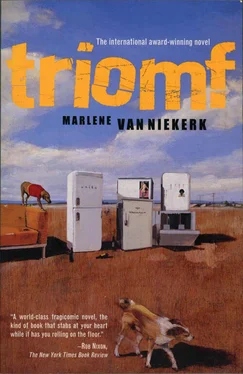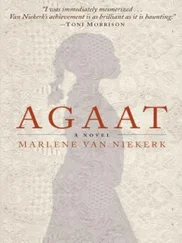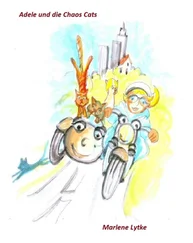‘Poof! Poof! Poof!’
‘Whoof! Whoof! Whoof!’
She throws them on to the grass. And then Toby goes looking for them, running up and down on the grass until she shoots some more.
‘Poof! Poof! Poof!’
‘Whoof! Whoof! Whoof!’
Quicker and quicker.
Goodness, Mol, where do you get the strength from, old girl?
He knows how scared she is of crackers.
All Pop can make out is Mol’s outline against the dark night sky as she moves around. The stoep-light’s off and so are the lights in the lounge. But each time the fireworks light up behind her in the street, he sees her more clearly. Once or twice, as she turns sideways on the stoep, he catches a glimpse of her face as she strikes a match and cups it with her hands till it takes nicely.
Mol’s face flickers against the dark as the flame dances up and down. He sees the ruts and nicks and bags under her eyes. He sees how she sucks her lips as she concentrates. Mol looks different. It’s ’cause she’s not wearing her tooth. Nowadays she never keeps it in her mouth any more. She says the plate’s too big.
They’re shrinking, both of them. They’re shrinking right out of their teeth. God in heaven, that people should start shrinking like this, gums first.
Pop goes out the front door. He pulls back his shoulders and straightens himself up. He clears his throat.
‘And what have we here! Fireworks, hey?’
‘This is fun. Look how jolly everyone is.’ Mol points to the street. ‘Come, Pop, you must also let one off. I’ve got two left here, one for you and one for me. Let’s light them together. Here! Don’t be scared, it’s nothing. I’ll light them for you.’
Mol’s eyes are shining.
Toby stands in front of them with his ears pointing up and his forelegs spread out wide. He lowers his front and wags his tail.
‘He’s trying to catch them, like tennis balls,’ says Mol. ‘They go “poof! poof! poof!” and then they’re empty, then there’s nothing left. Poof! Finish! Just a shell, with nothing left inside.’
‘Out of our shells. We’re shooting out of our shells. Poof! Finished!’
But Mol doesn’t want to hear. ‘Are you ready?’ she asks.
Pop holds up his cracker. Mol lights it and then quickly lights her own.
‘Poof-oof!’ they shoot, almost at the same time.
‘Whoof-oof!’ says Toby, running in a wild circle on the grass.
Pop sniffs the shell in his hand.
‘Yuk, throw it away,’ says Mol.
‘A bit of powder, just one shot. A spark, and then we’ve had it.’ Mol here next to him is pretending to be deaf. Shame.
‘Hoo-eee! Look! Look!’ she shouts. Suddenly, from behind the houses of Triomf, from Brixton’s side, a huge, red rose rises up into the sky on a long, thin stem of light. Slowly, without sound, it folds open and then falls away into the black air, layer upon layer. Like the folds of a dress. Or like someone turning slowly in a dance.
‘Red Alec!’ shouts Mol.
And then a yellow one.
‘Whisky Mac!’ Pop feels the name in his mouth. It almost tastes like something. Like what?
‘Beaautifull!’ says Mol, clasping her chest.
‘It must be at the showgrounds.’ Pop swallows. The taste is gone.
Together with all the people in Martha Street, they watch and cheer the showgrounds’ fireworks. It carries on for quite a while.
‘It’s a long time since we’ve had a Guy Fawkes like this, hey, Pop,’ Mol says when it looks like the show’s finally over.
‘Long time.’ He puts his arm around her and pulls her towards him. ‘I smell rain.’ He rubs her on the shoulder.
She looks up at him. He can see what she’s thinking. She’s thinking why’s he so lovey-dovey all of a sudden? Yes, why? He also doesn’t know why.
‘Come, come let’s go have a bath. It’s been a hard day.’ Let her think what she likes. He just needs to touch her.
OVERLOAD 
Mol waits for Pop in the dark passage outside the bathroom door. When they came back into the house, he asked her not to put on the lights. They were too bright, he said. Now he’s gone to the kitchen to fetch a candle. He’s looking on top of the dresser where they always keep candles, with the little lids to stand them on. Why’s he taking so long now? She hears things falling over. Pop bumbles around so much lately. Let her light a cigarette here in the meantime. Pop’s got his reasons. Maybe he’s getting a feeling in his bones that the lights will cut out again tonight. The electricity’s always been bad here in Triomf. Ever since the day they moved in. An overload problem. That’s what the municipality’s workers say when they come and work on the boxes. Not that the working ever makes much of a difference.
Treppie says that’s the way it goes in places like Triomf. He says it’s a sub-economic disease. It’s meant to remind you who you are and where you live. For that, Treppie says, nothing works better than cutting off people’s electricity.
Then of course there’s another never-ending argument, ’cause Pop says Treppie’s talking the biggest load of rubbish under the sun. He says the people in Triomf are the state’s own people. And the houses here were built by Community Development. For young civil servants, for policemen and Post Office workers, and for the people from Parks and Roads, Railways, Licences, Customs, Refuse and Gardening, and Pest Control. And don’t forget the people from Water and Electricity. You name it, says Pop. If you want to find them, you needn’t look any further than Triomf. You could almost say the whole municipality of Jo’burg lives here. And make no mistake, says Pop, these people understand the ins and outs of things, from top to bottom. They’re the kind of people who know how to help themselves to state property. Not to mention state electricity.
And if Treppie bothers to open his eyes, Pop says, then he’ll see how many people still paint their doors and their gutters with Public Works paint. Government brown. And how all the gardens behind the prefab walls are full of the Gardening Department’s left-over aloes. And how bricks and cement still get offloaded here by the lorry-full, in front of private houses. In broad daylight. Everything from municipal lorries to municipal kaffirs. Plastic pipes too, and bathroom tiles and wire-netting and paving stones and steel plates and trees in plastic bags. From the state nursery. You name it.
Not that Triomf has many trees. The roots struggle to get a grip. They first have to grow all the way through Sophiatown’s rubble. Pop says you have to dig six feet under Triomf’s tar before you find the old topsoil. Inbetween there’s just rubbish. It takes a tree three years to find the soil. And then it has to be a tough tree that kills everything in its path, like a black wattle or something meant for a state plantation. And even then, it’s a struggle. The only reason the oak tree at the bottom of the street is so big is ’cause it was planted before Triomf’s time.
That’s why they never planted anything here on their own plot. Never mind Lambert and his spanners.
So, Pop tells Treppie, when the lights cut out all the time it’s not a sub-economic disease, it’s a stealing disease, plain and simple. And if there’s any overload problem, it comes from the sins of bypassing. The municipality people connect their houses with wires that bypass the boxes. Then nothing shows on their meters and they pay bugger-all at the end of the month.
But it’s the women who pay the price. The women have to pay twice over. With their lives. That’s what comes from stealing, Pop says. He says Treppie must just open his eyes a bit — Pop used to backchat Treppie like this in the old days, when they still had a business in the yard — Treppie must just open his eyes a bit, Pop would say, and then he’ll see how many times little children come running out of their houses, screaming that their mommies have shocked themselves blue on the washing machines. Or they’re stuck on to the handles of the fridge. Burnt black. That’s what comes from wrong bypass connections.
Читать дальше













